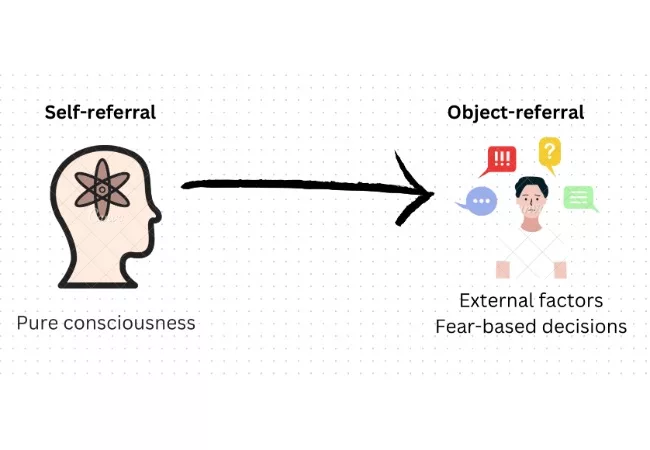There are many reasons that make me believe in the Law of Attraction/Law of Assumption. The more I explore it, the more it feels like discovering a treasure trove of insights that connect dots across various teachings—from religion to philosophy, psychology, and beyond.
The law of Attraction is not just as simple as “like attracts like”, it has a broader layer of knowledge that requires lots of learning and practices to fully understand its depth.
Now, if you’re curious about the Law of Attraction or simply about how the universe operates, the Seven Spiritual Laws of Success is the ultimate guide for that. So what are the seven spiritual laws of success? Deepak Chopra penned them in a book of the same name, and trust me, they’re eye-opening. These laws aren’t just about success in the conventional sense; they’re about aligning with the flow of life to live your life purposefully and with fulfillment.
So, let’s get started.

What Are The Seven Spiritual Laws Of Success?
The seven spiritual laws of success were introduced by Deepak Chopra, an Indian-American author and alternative medicine advocate, in his book “The Seven Spiritual Laws of Success,” first published in 1994.
Since then, the book has drawn big interest for its new way of perceiving life, which is very similar to the New Age Movement we have today. Peter Guber, Chairman, and CEO of Sony Pictures Entertainment, considered the book as “a virtual reality tool-kit for the 21st-century spiritual traveler”.
The seven spiritual Laws of Success include:
- The Law of Pure Potentiality
- The Law of Giving
- The Law of Karma
- The Law of Least Effort
- The Law of Intention and Desire
- The Law of Detachment
- The Law of Dharma
Each law deserves a single post to discuss in depth. In this post, I will provide a broad introduction to each law in the sequence mentioned above. This will give you a basic understanding of what each one is about.
For further reading and deeper understanding, I would recommend reading the book “The Seven Spiritual Laws of Success” by Deepak Chopra, which, by the way, is just a small book but is worth your time to read.
Seven Spiritual Laws Of Success #1: The Law of Pure Potentiality
The One breathed, without breath, by Its own power Nothing else was there . . .
– Hymn of Creation, The Rig Veda
The basic of the Law of Pure Potentiality
Various philosophical and scientific discussions point out the concept that everything originates from nothing. According to Deepak Chopra, this “nothing” is pure consciousness, existing within each of us.
In our essential state, we are pure consciousness, which is pure potentiality—the field of all possibilities and infinite creativity. Everything we perceive in reality is a manifestation of this pure consciousness.
The factor determining the expression from the unmanifest to the manifest is alignment with the probability among countless potentialities, known as the Law of Pure Potentiality.
To relate this to our daily lives, it means we can fulfill anything we want and create without limits. Because everything is possible, everything already exists in countless potentialities, and we just have to manifest it into reality.
Our relationship with the field of consciousness
In his book “The Seven Spiritual Laws of Success,” Deepak Chopra distinguishes two perspectives: object-referral and self-referral.
Object-referral involves deriving one’s sense of identity and worth from external factors such as possessions, status, or achievements. This occurs when you live separated from the field of pure consciousness, from your true self, which often leads to fear-based decisions and dependence on outer circumstances.
Self-referral, on the other hand, involves experiencing one’s true being, relying on an unchanging source—pure consciousness—leading to peace, joy, and authenticity within oneself. Self-referral also attracts people and things that we want to us.

Gain benefits from the Law of Pure Potentiality
We can make the Law of Pure Potentiality to work for us by trying to accessing our true selves through practices like silence, meditation, and non-judgment. Spending time in nature can also aid in alignment with our true selves.
In my experience, I’ve struggled with a tendency to judge others, leading to self-judgment and impacting my relationships and self-esteem negatively.
This judgmental mindset restricts the flow of energy between me and the field of pure potentiality. Practicing non-judgment by observing thoughts, feelings, and experiences without criticism has helped me stay in tune with the silence inside me—the gap between my thoughts and the field of pure potentiality.
Seven Spiritual Laws Of Success #2: The Law of Giving
Everything in the universe operates through dynamic exchange. Money symbolizes the life energy we give and receive as a result of the service we provide to others. The more you give, the more you receive.
However, giving must stem from the right intention. The intention behind our giving and receiving is crucial. When giving is joyful, unconditional, and from the heart, the energy behind it multiplies many times over.
If you desire love, learn to give love. If you seek attention and appreciation, learn to give attention and appreciation. If you aspire to material affluence, help others become materially affluent. If you wish to be blessed with all the good things in life, learn to silently bless everyone with all the good things in life. The more you give, the more you receive.
How to apply the Law of Giving
Like I mentioned, the act of giving is all about the intention and sincerity behind the gesture. A woman in my neighborhood surely isn’t rich, yet she consistently shares items like fresh cookies, flowers, or vegetables from her garden.
These offerings might seem small in material value, but they carry profound significance. It speaks about her generosity, thoughtfulness, and the care she holds for her neighbors.
You can only gracefully receive when you learn how to give to others.

You can practice this by frequently bringing a gift to whoever’s house you are visiting, being willing to give compliments, offering small gifts like a flower or a cup of coffee to those around you. Don’t forget to send birthday messages to your friends and cards on holidays.
Give what you can, and that’s all that matters.
Seven Spiritual Laws Of Success #3: The Law of Karma
The name speaks for itself, it’s a common law in various religious and philosophical traditions, including Buddhism. You choose how you react to people and circumstances, and therefore, you will get the corresponding results of your choice.
In Buddhism, karma is often explained as the law of cause and effect. Every action we take, whether physical, verbal, or mental, generates a force of energy that eventually returns to us in a similar form. This means that our actions shape our future experiences, both in this life and in future lives according to Buddhist belief.
The law of karma talks about how every action generates a force of energy that returns to us in like kind. When we choose actions that bring happiness and success to others, the fruit of our karma is happiness and success.
How to apply the Law of Karma
Deepak Chopra suggested when making a choice, you should ask yourself two questions: “What are the consequences of this choice that I’m making?” and “Will this choice bring fulfillment and happiness to me and also to those who are affected by this choice?”
This prevents you from getting caught up in trading emotional hurts or moralizing and choosing the right choice for yourself.
Seven Spiritual Laws Of Success #4: The Law of Least Effort
The Law of Least Effort, also known as “Do nothing and accomplish everything,” guides us to embrace the effortless flow of nature’s intelligence to achieve our goals in life. Nature operates seamlessly and effortlessly, and by aligning ourselves with this natural flow, we can achieve more with less effort.
“Grass doesn’t try to grow, it just grows. Fish don’t try to swim, they just swim. Flowers don’t try to bloom, they bloom. Birds don’t try to fly, they fly.” – Deepak Chopra
The Law of Least Effort also emphasizes the importance of acceptance. It encourages us to embrace the unfolding of life’s events, even when they diverge from our initial plans. Instead of resisting or fighting against circumstances, we learn to accept and adapt to them, allowing us to conserve energy and focus on what truly matters.
When we expend excessive effort in pursuit of material wealth and power, we often find ourselves chasing an illusory sense of happiness. By contrast, the Law of Least Effort reminds us to seek happiness in the present moment, rather than constantly striving for external validation or achievements.
How to apply the Law of Least Effort
To apply the law of least effort, practice acceptance. Learn to accept people, situations, circumstances, and events as they occur. Also, don’t always feel the need to defend your point of view or persuade others to accept it. Acknowledge differences and let them be.
You can try to open to receive new perspectives or simply pass without judgment. Don’t attach yourself to any perspective or defend your opinions; doing so is defending your ego.
Seven Spiritual Laws Of Success #5: The Law of Intention and Desire
As I mentioned in the first law, The Law of Pure Potentiality, everything comes from the field of unlimited potentiality, and anything is possible. We have the power to fulfill any of our desires, and we do that through attention and intention.
Intention and desire are how all potential in the world transforms into reality.
For example, the light bulb you use every day stems from a desire to have light in our daily life and the intention to create light by some people.
Chopra says, “Whatever you put your attention on will grow stronger in your life. Whatever you take your attention away from will wither, disintegrate, and disappear.”
The law of Intention and Desire teaches us the importance of placing our intention in the right place. Put your intention and attention on the goal, not on the obstacles, even if obstacles exist in your current environment. By setting your intention firmly on your goals and your desired outcomes, you will manifest a way out of obstacles naturally and effortlessly.

Keep your focus on your intent, realizing that, of course, part of getting there will involve problem-solving through some challenges, but don’t fall into the trap of focusing on them.
By focusing on your goal, your obstacles even transform into opportunities. Life is supposed to be full of surprises, and each obstacle or difficulty you face is a potential new opportunity if you see it the right way. Circumstances are the same, but the way you see them through intention will decide what they’re going to turn out to be. So use your intention wisely.
How to apply the law of intention and desire
It’s always good to write out your desires and intentions; that way, you can be specific and make them feel more real to you. You will become more committed and start to treat your goal as something serious, something possible.
Writing your list out also helps to ingrain these ideas and desired scenarios into your subconscious mind, and therefore, you will naturally attract people, events, and synchronicities into your life that help you fulfill your desires.
You should carry this list close to you and look at it frequently. Ideally, look at it before meditating, before going to sleep at night, or when you wake up in the morning.
Also, don’t get attached to the “want” of your desire; just acknowledge that it’s something you want, do your best, and trust in the nature intelligence.
Make a list of your desires. Carry this list with you. Look at it before meditating, before you go to sleep at night, and when you wake up in the morning. When things don’t seem to go your way, there is a reason. Look for the seeds of inspiration in those challenges.
Always remain in self-referral as we mentioned in the first law above. Don’t let yourself be influenced by the opinions and criticisms of the world.
Seven Spiritual Laws Of Success #6: The Law of Detachment
This law resonates with me deeply on many levels and has truly transformed my life. Detachment brings immense peace.
It’s interesting to me that the more I release attachment to something or someone, the easier and faster that thing will come to me. This has often happened to me, even when I no longer actively want that specific thing anymore. Because as people say, no desires, no resistance and then things will flow into your life.
The Law of Detachment doesn’t mean to teach you to stop wanting to get things in your life. Some people even misinterpret the law as teaching you to pretend you don’t want something. In fact, it’s about acknowledging your desire but not becoming obsessed with it. You know that when you want something, it doesn’t mean your life will be miserable without it; your life is already good as it is.
When things don’t seem to go our way, we can let go of our idea of how they should be. This stems from a higher inner awareness that everything will turn out for the best. We do our best without becoming obsessed with controlling the outcome or circumstances. We still have the intention of moving in a certain direction, but between point A and point B, there are infinite possibilities.
This mindset allows us to stay alert to opportunities, leading to powerful and exciting outcomes. Attachment, on the other hand, implies doubt and distrust in nature’s intelligence and its infinite organizing power. It’s the ego at play.
How to apply the law of detachment
Practice to release the need to control outcomes or circumstances.
Detach from outcomes by letting go of any fixed expectations.
Instead of fixating on specific results, focus on the present moment and the actions you can take now to move toward your goals.
Seven Spiritual Laws Of Success #7: The Law of Dharma
The law of Dharma teachs us that you are not born on this earth solely to make money and earn a living. Nor are you here to pursue materialistic goals just to prove your worth.
Everyone should have a life purpose, something deeply personal and meaningful to them. For some, it may be tied to their profession or vocation, while for others, it may involve relationships, personal growth, creativity, or service to others.
If you want to do something, even if it seems like it won’t lead to an easy or wealthy life, just do it. At the very least, make it a part of your life.

How to apply the Law of Dharma
Create a list of your distinctive talents and identify three activities you genuinely enjoy while utilizing those talents. When you engage in these activities to benefit others, you’ll find yourself immersed in the moment and generating abundance.
Every day, ask yourself, “How can I be of service?” and “How can I offer assistance?” These inquiries will guide you in extending love and support to your fellow human beings.
Final words
I hope I answered the question of “What Are The Seven Spiritual Laws Of Success?” As I said, I would recommend you to read the book “The Seven Spiritual Laws of Success,” as it will help you understand more about each Law. Exploring these principles in depth can profoundly enrich your journey toward personal growth and fulfillment.
There’s no need to try to learn and adapt all seven laws into your life simultaneously. I believe it’s best to identify an aspect you want to improve and focus on the corresponding law, working on it until you feel more comfortable and natural before moving on to the next one.






